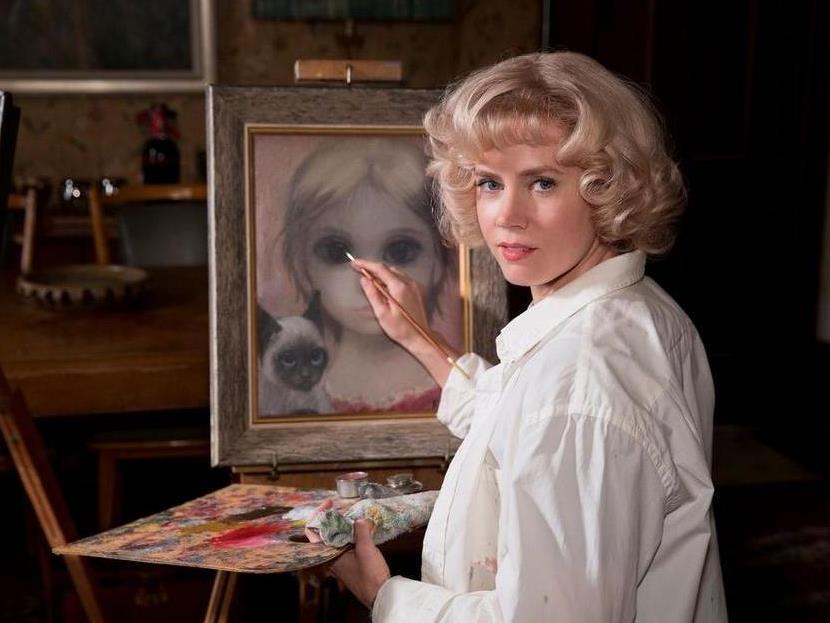Across the majority of his output, the words “Directed by Tim Burton” have conjured a specific image. As a filmmaker for nigh on four decades, he is nothing if not specific in his tastes, concerted in their application, and consistent across his movies. He prefers a combination of the dark, the fantastical and the quirky, and frequently casts the same actors. From Beetlejuice to Batman, Sleepy Hollow to Corpse Bride and Alice in Wonderland to Dark Shadows, the bulk of his works appear to belong together.
Big Eyes is both a departure from what has become his norm, and a reminder of the gentler, more restrained style Burton is capable of spinning, even if such instances are few and far between. And yet, like more subtle exaggerations of Ed Wood and Big Fish before it, it is also another film predicated on a tall tale – or a tale that would be tall, were it not based on reality. Artist Margaret Keane’s life provides the details, her work an apt fit for the director’s sensibilities. That he plays things relatively straight is a welcome choice that respects the story and benefits the movie.
Before taking on the last name that would become intertwined in her fame, Margaret (Amy Adams, Her) was a divorcee, a single mother and a woman trying to make a living by painting at a period in history when none of the three were in vogue. A meeting with fellow aspiring artist Walter Keane (Christoph Waltz, Horrible Bosses 2) soon becomes a marriage and then a business when her canvases of waif-like children with over-sized eyes become a hit with buyers though not with critics – but Walter takes the credit for his own.
As written by Scott Alexander and Larry Karaszewski (1408), Big Eyes traces Margaret’s time as a wife in the shadows and an artist in secret. Within dramatised confines and without diving too deep, it makes plain the actuality of society from the 1950s to the 1970s that allowed such a circumstance of marginalisation to arise, offering both a chronicle and commentary. Hints of feminist themes are engrained in the real-life events, though Burton prefers to hone in on the figure at the centre. The film may be a standard biopic, but there’s no mistaking the spirit that seethes within Margaret, building with every purposeful brush stroke and mournfully smoked cigarette.
Indeed, whether conveying festering resignation or simmering resilience, Adams proves a canny choice in the lead, with a Golden Globe for best actress in a comedy or musical to corroborate it. Hers is an affecting portrayal of understatement in opposition to Waltz’s comic pandering to his now-usual routine, though she is never overshadowed by his stretched-too-thin excess. Brief appearances by Listen Up Philip co-stars Krysten Ritter and Jason Schwartzman, as well as Danny Huston (The Congress) and Terence Stamp (Unfinished Song), round out the cast of friends and foes, adding colour around the central dynamic. Theirs are also flashier turns, yet Adams always shines as the quiet, considered heart of the movie.
With cinematographer Bruno Delbonnel (Inside Llewyn Davis), Burton crafts visuals to match Margaret’s distinctive paintings, preferring brightness to gloom and energy to eccentricity but never wandering into outlandish territory. The precision on display is evident, as well as a sense of lightness – aesthetically and tonally – aimed for but rarely realised in the director’s other recent fare. Of course, the strongest statement comes from reigning in his predilections to champion the peculiarities of another, allowing the titular paintings to be the kitschiest thing in every scene. It’s the crowning touch on an otherwise engagingly enough told, broad-based account of a persuasive story and particular style of artist, letting Burton’s directorial credit take on shades of a new meaning.
Rating: 3 stars out of 5
Big Eyes
Director: Tim Burton
USA, 2014, 106 mins
Release date: 19 March
Distributor: Roadshow
Rated: M
Actors:
Director:
Format:
Country:
Release:





